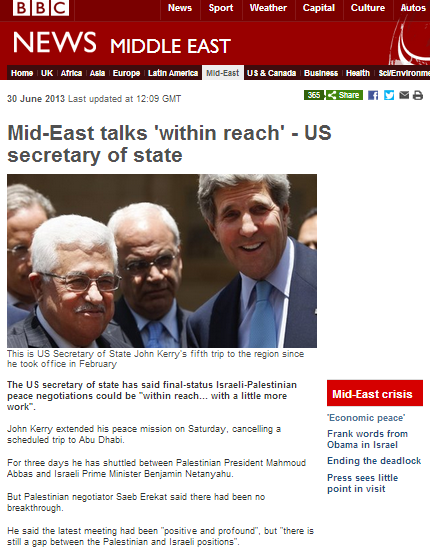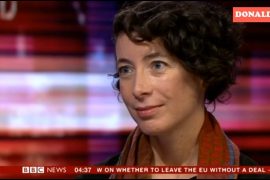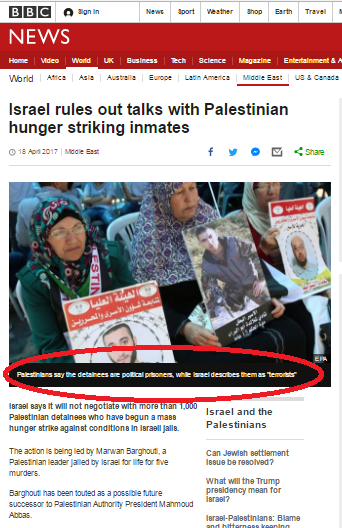The BBC’s coverage of US Secretary of State John Kerry’s latest visit to the Middle East includes a filmed report on his pre-departure press conference for BBC television news and a written article – both of which appeared on the Middle East page of the BBC News website on June 30th.
The written report underwent some changes until it reached its final version.
As we see above, no mention is made of the Palestinian factions, such as Hamas, which reject a two state solution to the conflict or of the second Intifada terror war in the BBC’s laconic, context-free statement:
“Two decades of on-off negotiations between Israel and the Palestinian Authority (PA) have failed to produce a permanent settlement, with the latest round of direct negotiations breaking down in 2010.”
In the article’s third version, somebody apparently remembered that BBC audiences must be kept on message with regard to ‘obstacles to peace’:
“The main stumbling block to talks has been Israel’s refusal to cease settlement-building as a precondition”
Revealingly, the placement of preconditions to negotiations seems to appear quite natural to the BBC and does not apparently merit the description “stumbling block”.
Later, that wording was slightly toned down:
“The main stumbling block to talks has been disagreement over the issue of Israeli settlement-building in the West Bank, which the Palestinians want frozen as a precondition to talks.”
Interestingly, the BBC does not describe Mahmoud Abbas’ demand for the release of Palestinian prisoners – the vast majority convicted terrorists – as a precondition to talks and does not trouble its audiences with details of the crimes committed by those prisoners.
“Among other issues, Mr Abbas is said to be pushing Israel to release the longest-serving Palestinian prisoners.”
The final version of the article also includes a side-box of analysis by Quentin Sommerville – formerly the BBC’s correspondent in China and Afghanistan – who, despite having spent most of his first month in the Middle East reporting from Turkey and Jordan, is already able to demonstrate competence in the crucial skill of recycling claims from Ha’aretz for the consumption of BBC audiences and appears to have memorised the standard BBC mantras on the subject of the ‘peace process’ very well.
“There were even rumours of summit [sic], to be held in Amman at the end of the week.”
“The release of Palestinian prisoners, and the development of Israeli settlements on the occupied West Bank remain the key stumbling blocks.”
Disappointingly, the BBC’s ‘new broom’ in the Middle East seems to have already inherited from his predecessors the ability to ignore considerably more significant “stumbling blocks” to meaningful negotiations such as ongoing Palestinian terrorism, continuous incitement and delegitimisation by the Palestinian Authority, the fact that the unelected Palestinian president is unable to set foot in part of the territory he is supposed to govern and the all-out rejection of such negotiations by the faction for which the majority of Palestinians voted when last given the opportunity.
Rather than perpetuating the deeply entrenched BBC tradition of herding its audiences into the blinkered belief that Mrs Cohen’s new extension in Ariel is the reason for the lack of peace between Israel and the Palestinians (and indeed, in the wider Middle East as a whole), it would be much more helpful to BBC audiences if Quentin Sommerville were to take the BBC’s commitment to inform seriously and provide them (and himself) with some real insight into why the Arab – Israeli conflict is so difficult to solve.
“The despicable Yasser Arafat bequeathed his people the toxic narrative that there was no Jewish temple in Jerusalem, and by extension that there is no Jewish sovereign legitimacy in this part of the world, and that Palestinian steadfastness, attachment to the land, and birthrate would ultimately see the unrooted Jewish colonialists sent back to their European homelands. The weak-willed Abbas has allowed that false narrative to fester, including in his schools and his media, rather than energetically disseminating a more accurate picture of competing, legitimate claims to a small, coveted area of land, requiring conciliation and compromise.
Last month, the Israeli prime minister who almost five years ago offered Abbas everything the Palestinians ostensibly seek, Ehud Olmert, concluded publicly for the first time, presumably with some reluctance, that Abbas is simply “not a big hero” — he didn’t have the guts to take the deal, because he hadn’t had the guts to lay the groundwork for a deal by telling his people some unpalatable truths about historic Jewish sovereign legitimacy.”
Not only does the BBC’s funding public have the right to expect to be told that important part of the story, but those correspondents also have an obligation to tell it, according to the agreements which define the BBC’s remit. Any BBC Middle East correspondent, new or old, should be aware of that commitment.










